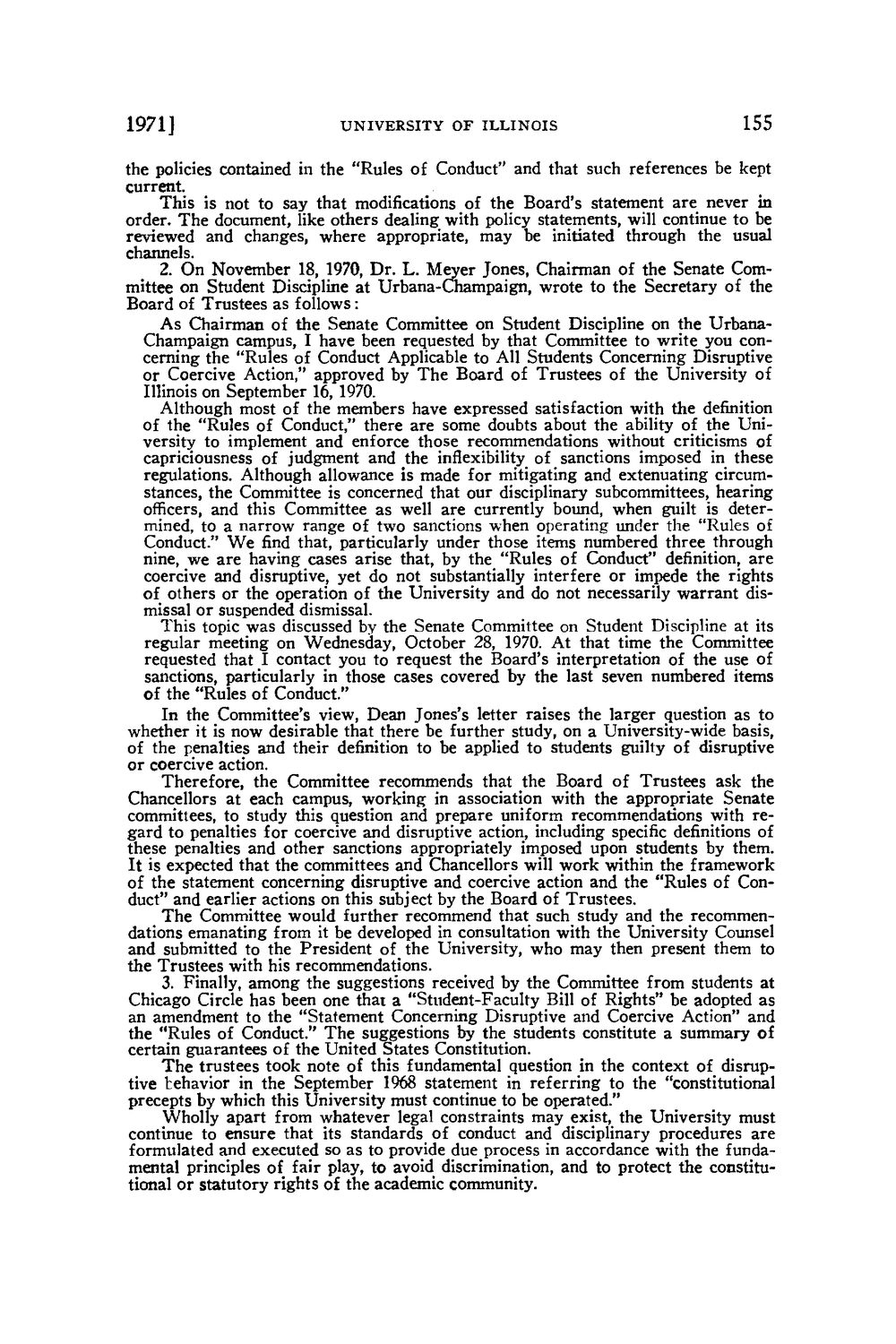| |
| |
Caption: Board of Trustees Minutes - 1972
This is a reduced-resolution page image for fast online browsing.

EXTRACTED TEXT FROM PAGE:
1971] UNIVERSITY OF ILLINOIS 155 the policies contained in the "Rules of Conduct" and that such references be kept current. This is not to say that modifications of the Board's statement are never in order. The document, like others dealing with policy statements, will continue to be reviewed and changes, where appropriate, may be initiated through the usual channels. 2. On November 18, 1970, Dr. L. Meyer Jones, Chairman of the Senate Committee on Student Discipline at Urbana-Champaign, wrote to the Secretary of the Board of Trustees as follows: As Chairman of the Senate Committee on Student Discipline on the UrbanaChampaign campus, I have been requested by that Committee to write you concerning the "Rules of Conduct Applicable to All Students Concerning Disruptive or Coercive Action," approved by T h e Board of Trustees of the University of Illinois on September 16, 1970. Although most of the members have expressed satisfaction with the definition of the "Rules of Conduct," there are some doubts about the ability of the University to implement and enforce those recommendations without criticisms of capriciousness of judgment and the inflexibility of sanctions imposed in these regulations. Although allowance is made for mitigating and extenuating circumstances, the Committee is concerned that our disciplinary subcommittees, hearing officers, and this Committee as well are currently bound, when guilt is determined, to a narrow range of two sanctions when operating under the "Rules of Conduct." W e find that, particularly under those items numbered three through nine, we are having cases arise that, by the "Rules of Conduct" definition, are coercive and disruptive, yet do not substantially interfere or impede the rights of others or the operation of the University and do not necessarily warrant dismissal or suspended dismissal. This topic was discussed by the Senate Committee on Student Discipline at its regular meeting on Wednesday, October 28, 1970. At that time the Committee requested that I contact you to request the Board's interpretation of the use of sanctions, particularly in those cases covered by the last seven numbered items of the "Rules of Conduct." In the Committee's view, Dean Jones's letter raises the larger question as to whether it is now desirable that there be further study, on a University-wide basis, of the penalties and their definition to be applied to students guilty of disruptive or coercive action. Therefore, the Committee recommends that the Board of Trustees ask the Chancellors at each campus, working in association with the appropriate Senate committees, to study this question and prepare uniform recommendations with regard to penalties for coercive and disruptive action, including specific definitions of these penalties and other sanctions appropriately imposed upon students by them. It is expected that the committees and Chancellors will work within the framework of the statement concerning disruptive and coercive action and the "Rules of Conduct" and earlier actions on this subject by the Board of Trustees. The Committee would further recommend that such study and the recommendations emanating from it be developed in consultation with the University Counsel and submitted to the President of the University, who may then present them to the Trustees with his recommendations. 3. Finally, among the suggestions received by the Committee from students at Chicago Circle has been one that a "Student-Faculty Bill of Rights" be adopted as an amendment to the "Statement Concerning Disruptive and Coercive Action" and the "Rules of Conduct." The suggestions by the students constitute a summary of certain guarantees of the United States Constitution. T h e trustees took note of this fundamental question in the context of disruptive behavior in the September 1968 statement in referring to the "constitutional precepts by which this University must continue to be operated." Wholly apart from whatever legal constraints may exist, the University must continue to ensure that its standards of conduct and disciplinary procedures are formulated and executed so as to provide due process in accordance with the fundamental principles of fair play, to avoid discrimination, and to protect the constitutional or statutory rights of the academic community.
| |